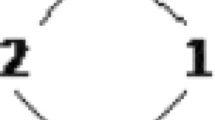Abstract
This paper treats a kind of a modal logic based on the intuitionistic propositional logic which arose from the “provability” predicate in the first order arithmetic. The semantics of this calculus is presented in both a relational and an algebraic way.
Completeness theorems, existence of a characteristic model and of a characteristic frame, properties of FMP and FFP and decidability are proved.
Similar content being viewed by others
References
G. Grätzer, Universal Algebra, Van Nonstrand, New York, 1969.
M. H. Löb, Solution of a problem of Leon Henkin, Journal of Symbolic Logic 20 (1955), pp. 115–118.
R. Magari, Modal diagonalizable algebras, Bollettino del-Unione Matematica Italiana, (5) 15-B (1978) pp. 303–320.
H. Rasiowa and R. Sikorski, Mathematics of Metamathematics, PWN, Warszawa, 1970.
G. Sambin, An effective fixed point theorem in intuitionistic diagonalizable algebras, Studia Logica XXXV, 4 (1976) pp. 345–361.
K. Segerberg, An Essay on classical modal logic, Filosofiska studier 13, Uppsala, 1971.
C. Smorynski, The derivability conditions and Löb's theorem, A short course in modal logic, unpublished manuscript.
A. Ursini, Intuitionistic diagonalizable algebras, Algebra Universalis 9 (1979), pp. 229–237.
Author information
Authors and Affiliations
Rights and permissions
About this article
Cite this article
Ursini, A. A modal calculus analogous to K4W, based on intuitionistic propositional logic, Iℴ. Stud Logica 38, 297–311 (1979). https://doi.org/10.1007/BF00405387
Received:
Revised:
Issue Date:
DOI: https://doi.org/10.1007/BF00405387



